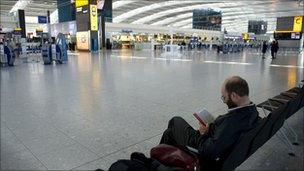Airlines must pay compensation for some strike delays
- Published

The ruling racks up the pressure on European airlines to pay compensation when a delay is not their fault
Air passengers who suffer delays more than a day after a strike must be compensated by their airlines, says the European Court of Justice.
The court has ruled on the case of a man from Finland whose Finnair flight was delayed, two days after a strike at Barcelona airport in 2006.
The airline had argued that the strike delay was an extraordinary circumstance and that compensation was not due.
The court disagreed, ruling that strikes were not extraordinary enough.
"The occurrence of extraordinary circumstances - such as a strike - resulting in an air carrier rescheduling subsequent flights does not give grounds for denying boarding or for exempting that carrier from its obligation to compensate passengers denied boarding on those later flights," the ECJ said.
European rules mean that airlines must pay compensation to their passengers if they have been "denied boarding" on flights within the European Union of more than 1,500km.
The court ruled that a strike could only be a good reason for stopping someone boarding a booked flight, with no compensation payable, if the delay took place on the day of the strike itself.
Two days after the strike in Barcelona on 28 July 2006, the Finnish man, Mr Timy Lassooy, was bumped off his original flight back to Helsinki and then had to fly back on a later flight that day instead.
"That situation is comparable to a denial of boarding due to initial overbooking by the carrier for economic reasons," the court explained.
"Thus, Finnair had reallocated Mr Lassooy's seat in order to be able to carry other passengers, itself choosing which passengers to carry," it added.
"The court holds that the concept of 'denied boarding' relates not only to cases of overbooking, but also to those concerning other grounds, such as operational reasons," said the ECJ.
- Published16 May 2012
- Published16 February 2011
- Published17 August 2010